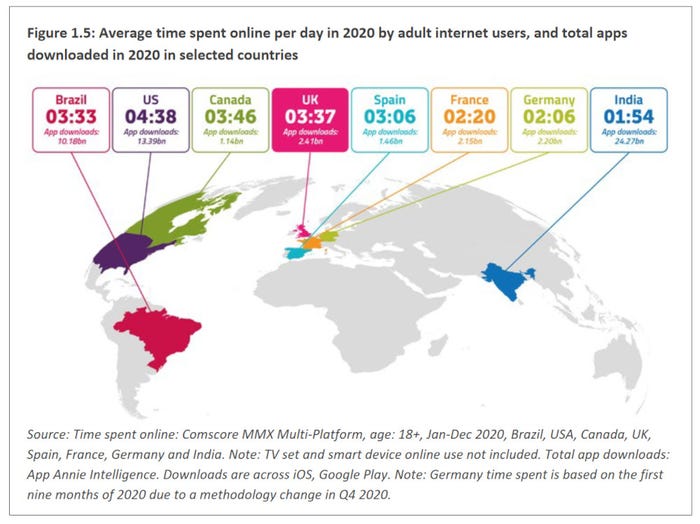UK adults spent as much as an hour longer per day online than our peers in other major European markets in 2020, according to the latest research from Ofcom.
June 9, 2021

UK adults spent as much as an hour longer per day online than our peers in other major European markets in 2020, according to the latest research from Ofcom.
Given that information, one cannot help but wonder what we were doing for that extra time…or rather, what our European neighbours were up to offline that we were missing out on.
Ofcom’s Online Nation 2021 report is not quite granular enough to provide that kind of information, but what we do know is that the UK is fairly middle-of-the-road on the global stage when it comes to time spent online, with UK internet users surfing for longer than those in France, Germany and Spain, and much longer than users in India, but for less time than consumers in the US.
Adult internet users in the UK spent an average of 3 hours and 37 minutes per day online last year, just four minutes longer than users in Brazil and nine minutes less than those in Canada, Ofcom reports, citing data from CommScore. We downloaded 2.4 billion apps last year, again, more than in much of Europe, but significantly fewer than the 13.4 downloads recorded in the US and 24.3 billion in India; there is, of course, a population size issue to take into account there though.

As for what we were up to during all those hours online, well, it’s mainly about Google, Facebook and Amazon. Using September 2020 as a sample month, Ofcom reported that Google and Facebook properties were used by 99% and 97% of online adults respectively, while Amazon sites came in third at 92%.
In terms of time spent, Google-owned sites were used for an average of 52 minutes per day in September, up from 47 minutes a year earlier, while Facebook remained in second spot with 29 minutes, although that represented a decline from 36 minutes in 2019. That’s quite an interesting stat, when you consider that lockdown sent many more people to social media. It is no coincidence then, that TikTok owner Bytedance was a new entrant in the ranking in third spot with 20 minutes of usage per day, while Snapchat also joined the top ten at eight minutes and Twitter increased average minutes of usage to five from three.
Google was the most-used property in a number of the eight markets covered by the Ofcom report, namely Brazil, France, Germany, India, Spain and the US, with Facebook coming second in five; Microsoft sites feature in the top ten properties of all the countries examined in the study.
The big change in social media usage last year was the rise of the social video site, particularly among young adults. YouTube experienced growth in the UK, with usage among 18 to 24-year-olds growing to an average of 1 hour 16 minutes, up 11 minutes on-year, for example. Meanwhile, the star of the show was the now ubiquitous TikTok which had racked up 14 million UK adult visitors by March this year, up from 3 million 18 months earlier. 18-24s spent an average of 38 minutes per day on TikTok in September, more than double the year-earlier figure.
Speaking of adult, almost half of the UK adult population – or 49% – visited an adult content site in September 2020, with the most popular, Pornhub, reporting 15 million visitors, up by a million on the previous year. Pornhub says the UK is its third highest source of traffic, and an average duration of visit for a UK user is 10 minutes and 20 seconds.
Make of that what you will…particularly in the context of UK internet users spending longer online than their peers elsewhere.
Maybe it’s something to do with the weather…
About the Author(s)
You May Also Like








.png?width=300&auto=webp&quality=80&disable=upscale)


_1.jpg?width=300&auto=webp&quality=80&disable=upscale)


.png?width=800&auto=webp&quality=80&disable=upscale)